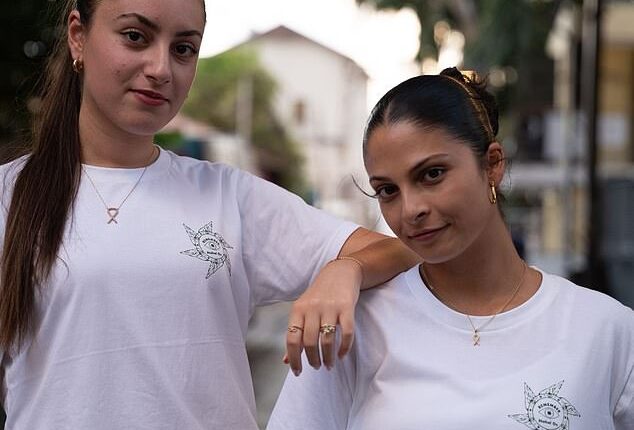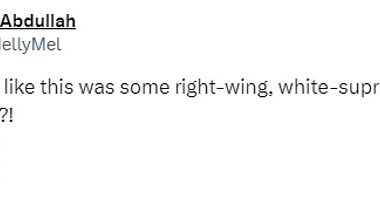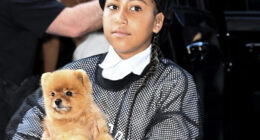As is the tradition among the women known as Israel’s ‘eyes on the border’, Shahaf Nissani hosted a farewell ‘tea time’ feast before her last shift watching Gaza.
Flanked by nearly 20 of her closest friends from the all-female battalion of Border Observers, she launched herself into the festivities as the young women sang, danced, joked and partied into the night on October 6, 2023. Possessing a ‘feeling’ she could not quite place, Shahaf, 20, had even christened the event The Last Disco.
Party balloons spelling out that name hung from the wall on the Nahal Oz observer base.
Within hours Shahaf would be dead, along with all but four of those partygoers. Daniella Gilboa and Karina Ariev were among the few who survived – only to be kidnapped and taken into Gaza where they were held for 477 days.
Today they tell their story for the first time, two years on from the horror of the slaughter that happened the next day, October 7.
‘It was dreamlike,’ says Karina, 21, of that last meal in an exclusive joint interview for the Daily Mail. ‘There was this connection between all of us. It was the best time we ever had together. We didn’t stop. Everything made us laugh. It was divine, magical.’
‘Looking back, it was like The Last Supper,’ says fellow survivor Daniella, 21, who with Karina was released last January.
‘We asked Shahaf, why did you pick this name – The Last Disco? She said, “I just have this feeling.” She couldn’t explain it.’

Karina Ariev (left) and Daniella Gilboa (right), both on mandatory national service with the all-female battalion of unarmed Border Observers, were taken hostage by Hamas on October 7, 2023. Pictured here after their release

Shahaf Nissani, 20, organised a farewell feast on October 6, 2023 – the night before Hamas’ attack – which she christened ‘The Last Disco’. Within hours Shahaf would be dead, along with all but four of those partygoers.

Party balloons spelling out Last Disco hung from the wall. Asked why she picked this name, Shahaf said: ‘I just have this feeling.’
At the supper, Shahaf read a farewell letter to her friends, all aged between 18 and 20, that ended: ‘I hope you will remember me.’ Then she took up the watch from midnight to 4am on October 7. It was at 6.29am that everyone on base was awoken by deafening explosions.
Hamas stormed the base at Nahal Oz in southern Israel, killing 53 soldiers including Shahaf and 15 other unarmed female Border Observers on compulsory national service.
Karina, from Jerusalem, reveals today how she saved her own and Daniella’s life by picking up a live grenade thrown into their shelter and hurling it back at the terrorists.
Soon afterwards Hamas filmed them as they were forced to sit for three hours in the blood of their executed friends, their hands bound, before being taken into Gaza with five other observers: Ori Megidish, 21, Noa Marciano, 19, Naama Levy, 21, Liri Albag, 20, and Agam Berger, 21. Ori was rescued after three weeks while Noa was murdered in captivity.
Karina, Daniella, Naama, Liri and Agam were held in cages underground, forced to eat donkey food and subjected to psychological torment before finally being freed. The girls’ faces became known around the world because the Daily Mail published powerful images of them under the headline ‘Don’t Forget Them’ in January 2024. The article raised their profile globally, as their families took copies of it around the world – to the UN, to lawmakers in Washington and national leaders.
Today, Daniella and Karina reveal they believe our coverage contributed to their release and helped save their lives. ‘We know this was a big thing that changed our status and made us so important,’ says Daniella. ‘We really want to say thank you to the Daily Mail. It is really unimaginable for a non-Israeli paper to give us such a platform. We have a deep, profound gratitude to your readers.’
The pair also tell us of their determination to honour the promise they made to Shahaf and their fallen comrades – that they, too, will never be forgotten.
Border Observers have an ‘unbreakable bond’, they say, as it is one of the least desirable postings in the compulsory national service which nearly all Israeli women must complete from the age of 18.
They receive no training in weapons and have nothing to defend themselves with, despite being stationed in dangerous territory right next to Gaza where they must watch for trouble on two four-hour shifts every day.
‘It’s tough conditions and high responsibility,’ says Daniella, from Petah Tikva, near Tel Aviv. ‘That’s what holds us together.’

Shahaf Nissani, 20, organised the ‘Last Disco’ before her final watch as an unarmed border observer at midnight on October 7, 2023. She was killed when Hamas stormed the base.

Today, Daniella and Karina believe the Mail’s coverage contributed to their release and helped save their lives. ‘We know this was a big thing that changed our status and made us so important,’ says Daniella. ‘We have a deep, profound gratitude to your readers’
Comradeship is what saw them through. Both Daniella and Karina were inseparable on the base from their best friend Aviv Hajaj, 19, a talented musician who would perform songs with Daniella there. Another close friend was Yael Leibushor, 20, a matriarch figure just one year older than them.
‘She was like a mother, I’m telling you, an old soul,’ says Daniella of Yael. ‘She was protecting us from going crazy in the role.’
It is clear from what they say that both their role as lookouts and a female instinct the two young women can’t quite place gave all the Border Observers an eerie sense of foreboding in the days running up to October 7.
‘The truth is that usually on Fridays there was a riot – a lot of flags on the fence, tyres burning, Palestinians protesting,’ says Daniella. ‘But on October 6 there wasn’t anything. There was silence. It was weird.’
The women had also seen terrorists training over the border in Gaza in the weeks before October 7 and comrades had warned commanders that something was evidently planned. But the warning clearly fell on deaf ears.
This perhaps explains why Shahaf christened her farewell feast The Last Disco and also the conversations they had while manning the barricades in the early hours of October 7. ‘We started talking to each other about what would happen if there was a raid,’ said Karina. ‘If the terrorists get on base, what do we do? What if someone gets kidnapped? This was two hours before it happened.’
Both had been on watch until 4am but afterwards neither Karina nor the women’s friend Aviv could sleep. ‘We talked for two and a half hours,’ Karina said. ‘She really opened up about a lot of things. It was like she was saying goodbye.’
They had barely got their heads down when the deafening explosions rocked the base. Aviv and Karina sprinted to the bomb shelter and held each other in terror. Others were rushing there in numbers. ‘Then Danielle came and I just pulled her towards us,’ Karina says, still referring to her friend by the name she had before her parents added an ‘a’ for spiritual protection after she was kidnapped. ‘We were the three of us until the last moment.’

Hamas filmed Daniella (l) and Karina (r) as they were forced to sit for three hours in the blood of their executed friends, their hands bound, before being taken into Gaza with five other unarmed observers
Terrorists sprayed them with bullets, killing friends around them. Aviv was hit and died beside Daniella and Karina. Were it not for Karina’s heroics, she and Daniella too would have died. ‘They threw a grenade at my head,’ she said. ‘I remember my father telling me if I ever get a grenade to push it away from me.
‘I had my eyes closed. I felt the grenade touch me on the head and Daniela in the lower body. I felt it and threw it out.
‘My belief is it wasn’t my hand because I couldn’t feel my hand. God picked it up for me. He threw it for me. It was the hand of God.’
Daniella was shot badly in the leg and both have shrapnel from grenades lodged in their body for life, but by ‘complete luck’ they survived, along with just five others out of the 29 who took cover in the shelter.
Marched outside by terrorists, the seven girls’ hands were bound and they were pinned against a wall. The terrorists filmed them as they were held for three hours, surrounded by the bodies of their friends. They were leered at by the gunmen who called them ‘beautiful’ and boasted of their achievement in taking them captive.
‘I told Karina to just say what they want because we are being filmed,’ said Daniella, who was in agony from her gunshot wound.
‘I was really scared. I didn’t know why they were filming. I didn’t understand until they said everyone, together, you are all going to Gaza. That was after three hours. Three hours that we just sat in front of our friends’ bodies. That was the real torture.’
It was Hamas footage of their terrified faces that day which the Daily Mail used, with the family’s permission, in that January 2024 story to show the world their plight – and both women say, shockingly, they are all too familiar with the video. ‘They showed it to us,’ Daniella said. ‘They made us watch it. All 27 minutes of the video. Our friends dying…’
Both are too traumatised to speak any more of what they suffered in captivity.
Shortly after we published our ‘Don’t Forget Them’ story, both appeared in a cruel hostage video where they were forced to beg for their lives from the tunnels of Gaza. Then, in December last year, Hamas published a picture of Daniella’s body hidden under a funeral cloth but intentionally showing a distinctive tattoo on her arm – and claimed she had been killed in an IDF strike. Her parents Orly, 51, and Ran, 55, never lost faith, however, praying that the holy protection they had given her might bring a miracle. It transpired Hamas had made her fake her own death – something she cannot talk about.

Karina, Daniella and Doron Steinbrecher appear in a cruel hostage video from Gaza just weeks after the Daily Mail’s powerful story highlighting their plight was published in January 2024.
By sheer chance Orly managed to get a message through to them on a 10-minute show dedicated to Daniella on the Israeli army radio station eight months into captivity. ‘We asked to hear the station and we heard my mum,’ says Daniella. ‘She said a message to me, “I hope you and Karina are together and that you support each other.” It’s from God, I’m telling you –there’s no chance. It is one in a million. It is almost impossible that she got through. It felt like she was reaching out to me from the other side.
‘Me and Karina just looked at each other. The odds are so slim we could not believe it happened. We were crying all day together. We were one for each other.’
Karina, who had also heard her sister Sasha, 26, on the same station just a week before, said: ‘It broke me. It made me feel. It gave me hope. It also brought me a message from my family. They understand that we’re together. Orly’s words really touched me.’ On being held together, she adds: ‘It was a blessing from Heaven that we were together.’
She believes it has given them a mission to preserve the memories of their fallen friends. They made us go through this together, to keep their memories alive,’ says Karina. ‘This was our belief through captivity, what kept us going, through our friendship we could preserve their memories.’
On their release, where they were seen defiantly raising their fists when brought on stage before a Hamas crowd, Daniella said: ‘What a victory!’ Karina adds: ‘Me and Danielle won and we felt pride in ourselves.’ They even wrote ‘we won’ on a whiteboard handed to them by the IDF on the helicopter out of Gaza.
They were reunited with their families onboard and as they flew back to Israel both immediately messaged the families of the friends they had lost.

Karina and Daniella write ‘We won’ on a white board in the Israeli helicopter out of Gaza. To the right, Daniella’s parents Orly and Ran smile beside them after being reunited following 477 day of torment.

Karina is reunited with her parents Ira and Albert Ariev after being released from Gaza in a ceasefire in January 2025.
‘It is really hard,’ says Karina. ‘We are working all the time trying to find ways to commemorate them.’ Both battle survivor’s guilt. ‘I personally haven’t met too many of the parents, even though I spent most of my day with their daughters in my mind,’ says Daniella. ‘It’s really hard to look them in the eye, still.’
They say they cannot begin to move on until the 48 remaining hostages in Gaza come home.
‘We’re really trying to recover but it’s not really possible,’ Karina said. ‘We feel the pain of the other families. We wish them all the best and that they all come back.
‘Only then can we start to think about our future.’



























